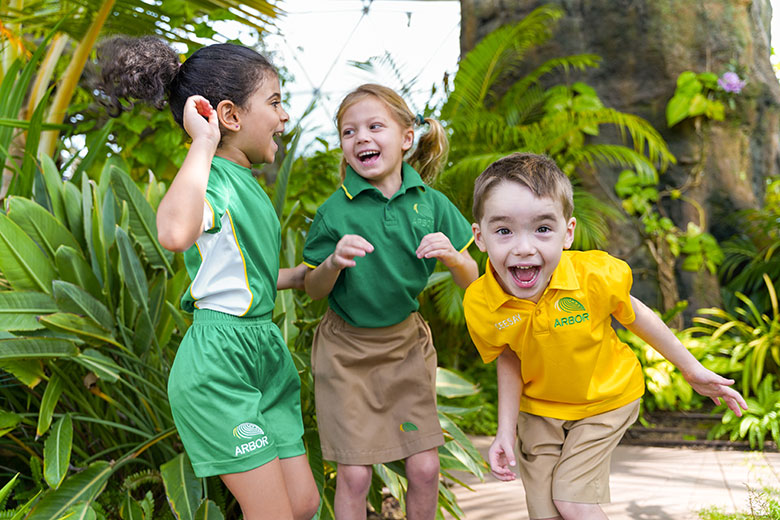The Arbor School, with a contemporary ethic based on compassion and responsibility, offers young people a transformational learning journey that combines profound intellectual thought with engaging and relevant activities to ensure students link their learning to real-world challenges. The school’s decision to switch to sustainable school uniforms, free from harmful chemicals and produced in certified working conditions, is typical of its approach to education, and we caught up with Principal Brett Girven in Kenya, where Arbor’s ethical stance is also having a positive effect on Kenyan schoolchildren.
EdUAE: How did you get on this path, where you combine education with your passion for the environment?
Brett: I probably didn’t realise it as a kid, but I had lots of informative experiences. I grew up on the New Zealand coast, so there was a lot of nature and being in the water. Abundant wildlife was natural to me. But I think it was reading fiction that got me excited about being a marine biologist, so I went to university and studied marine biology, which morphed into zoology and then environmental science. What I liked about environmental science was the fact that the environment is important and that humans are a part of it; they are not separate things.
This led to teaching, which began in New Zealand, went to the UK for a bit, then back to New Zealand, and saw an opportunity in the Middle East and just followed my nose really and just rose through the ranks to Principal and I was working in Dubai, really happy at a high achieving school, and then the opportunity came when I was called to be told there was an eco-school in Dubai – it was like this amazing twist of fate that just came full circle.
I made a lot of personal choices too. I stopped eating meat a while back, for instance, just because I didn’t like what was on offer, and then went plant-based, fundamentally vegan, because of the sustainability issues. So I’d made some pretty significant life choices anyway. So, the opportunity to lead at Arbor was an unbelievable opportunity at that point.
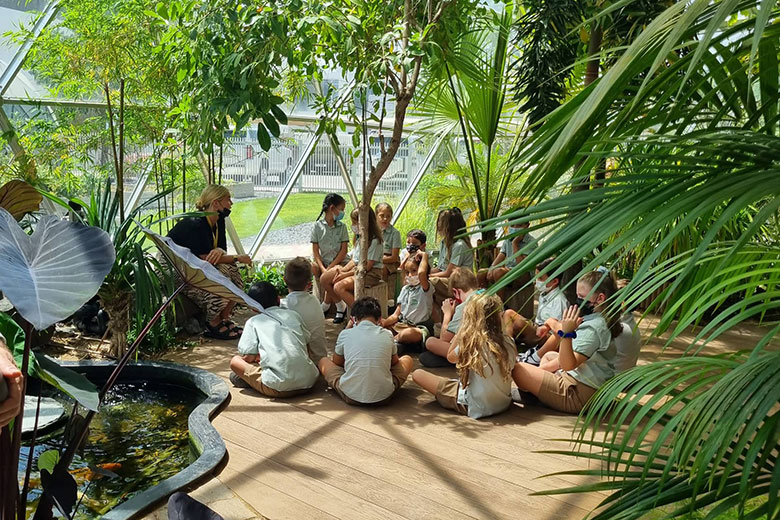
EdUAE: Explain how Arbor came about?
Brett: Arbor was started with a vision to be a sustainable school, and there weren’t three years of development to get there. It is a school grounded in the English National Curriculum, but the whole sustainability thing was developed as we went along. We’re tweaking and adjusting, but I think we’ve made significant advancements over the past few years.
EdUAE: The CEO is an interesting character isn’t he, because his beliefs are at the heart of the school?
Brett: Our CEO, Dr Sa’ad Al-Omari, is a really intelligent, caring guy who has a background in palaeontology. He’s an animal lover, he’s inclusive, and he’s a businessman, so he cares as an educationalist about what we are delivering in the maths class, as well as how we are providing the welfare for the turtles in our pond and the business aspect.
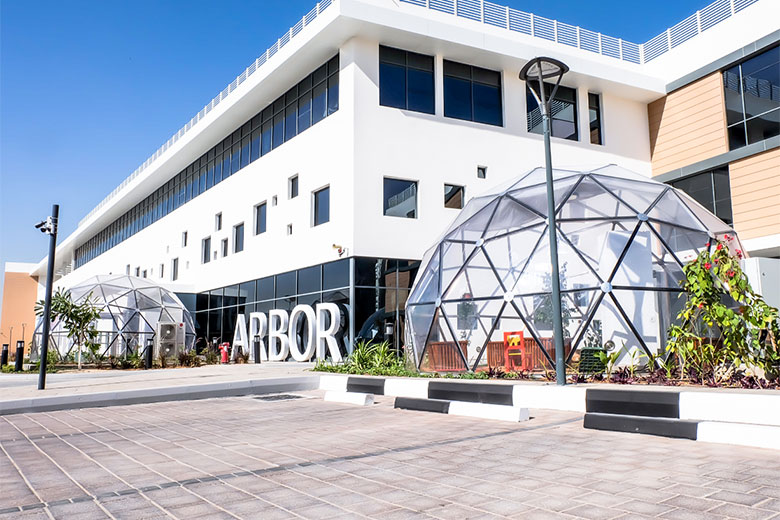
Our Early Years make fantastic progress because our eco-principles are age-appropriate and are things that they are emotionally, cognitively able to connect with
EdUAE: How does the Arbor School deliver on those principles and values?
Brett: It all starts with careful recruitment. So we search very clearly for the attributes we want – they have to be great teachers first, but we’re also looking for teachers and a certain mindset. Some of the people who join us are green to the bone. Then there is the curriculum, which is much more than paint by number because you have a really good thought out framework that has been developing for about a thousand years. The eco-literacy part is the hardest because it’s not just the ‘what’, it’s the ‘how’ and ‘why’, so we work hard to develop our eco-literacy principles, and that gives us a performance criteria. Now we’re looking at external experts to see how eco-literacy is affecting the kids. Are they really buying in or just paying lip service. And we’ve got people coming and asking us to be involved in that; two or three researchers at the moment are ready to come and look at what we are doing.
EdUAE: What about practical examples of things in the school you’re done to deliver these principles?
Brett: We’ve always thought of it as a kind of a triangle, where it’s more experiential, more practical, and more hands-on at the bottom end of the school, with the younger kids. As it goes up, it becomes more nuanced and sophisticated because then you start talking about being good at science, good at maths, and good at English, and when you apply that mastery to a question you’re more equipped to answer it.
So that triangle at the moment looks like what we call the curiosity approach. It’s leading through questions in the Early Years, defining thoughtfully and carefully the learning experience for children – it’s all learning through play, but you’ve got to think about the materials you use, the context, the ‘where’ as much as the ‘why’. Our Early Years make fantastic progress because our eco-principles are age-appropriate and are things that they are emotionally, and cognitively able to connect with. You don’t throw eco-systems at them; you talk about connections and things to do with nature.
As you go up and the kids get older, things become more problem-based with students working in groups. It becomes more than just doing a project, it’s driven by a big question, perhaps historical or science-based, and we theme it with a green approach, and that works really well.
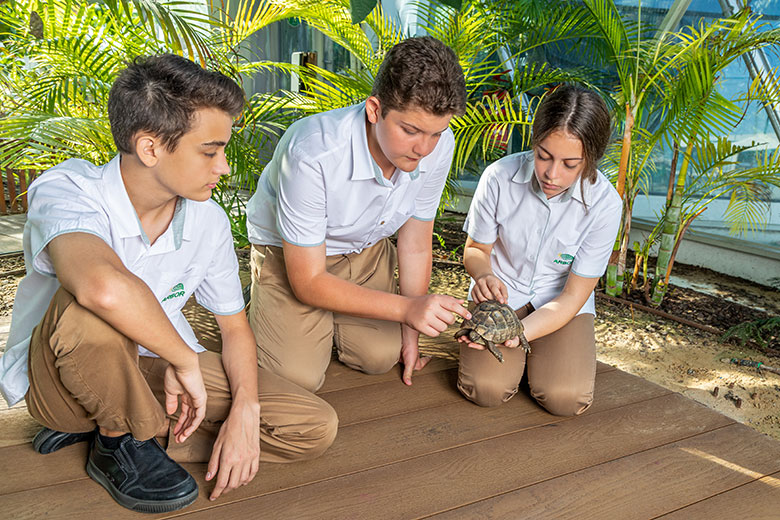
What I liked about environmental science was the fact that the environment is important and that humans are a part of it; they are not separate things
EdUAE: What about the physical aspects of what you are doing?
Brett: Even throughout Covid, we managed to get the little one out playing in nature, getting muddy, getting dirty, having a blast, and the community loved that. In Primary, they are in the biodomes and they’re planting food and interacting with animals and all those things that help them connect with nature; helping them to care about nature. The next step is how do you impact and make change? And that’s through curiosity, connection, passion and purpose. The aim is to sustain the child’s journey of curiosity so that they are still asking great questions as an 18-year-old.
EdUAE: What is a biodome?
Brett: There are six biodomes in all, including three large ones. The larger domes are themed ‘untouched nature’, ‘the relationship between nature and man’, and a ‘maker space’, where students can take the inspiration from the former two biodomes and create, experiment and innovate with state of the art resources, such as a bank of 3D printers.
EdUAE: Tell me about some of the initiatives the school undertakes?
Brett: A school can only handle so much change, so when we had our current uniform supplier contract coming to an end, we needed to look at whether we were going to renew, and then an opportunity came up. The reason we took that challenge on more than anything else was our core mission. We try to take on one big initiative and year and uniforms were one of those, food has been another.
What we wear can have a lot to say about who we are. It’s a powerful experience when we wear clothes that tell a story or make a statement.
The school uniform brand, Kapes, is leading the way, offering schools, parents and children ethically made and sustainable school uniforms. They are made in their entirety from quality sustainable materials, including GOTs certified organic cotton, recycled polyester, regenerated nylon, and recycled ocean plastics,
Kapes came with that idea and there’s a real story to be told. It becomes something you become interested in through storytelling and other elements such as carbon offsetting – it has a virtuous cycle that we can get behind. And, of course, the fact for every school uniform purchased by Arbor, another is donated free of charge to a child in Kenya is a huge thing – it kind of squares the circle.
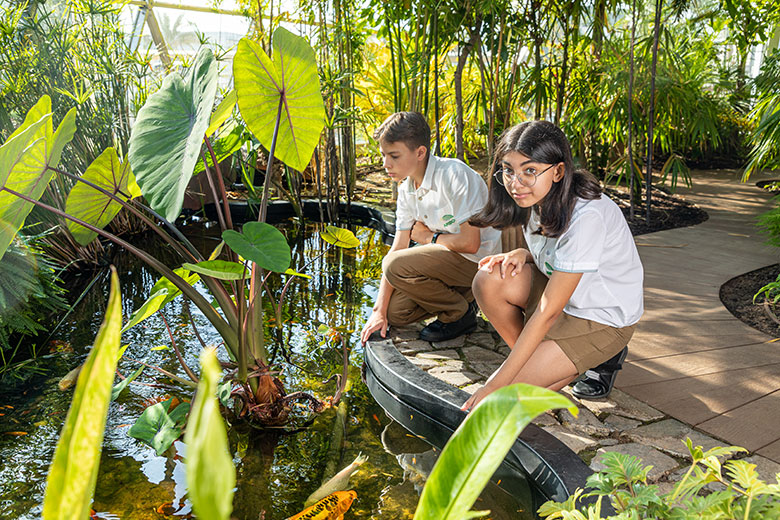
The aim is to sustain the child’s journey of curiosity so that they are still asking great questions as an 18-year-old
EdUAE: There will be more opportunities like this going forwards?
Brett: Yes, and like all of these opportunities they are slow burners. And there are opportunities to leverage off Kapes as a project-based learning experience because the children can see it as a working example of business for good. They can see how things connect and how an ecosystem is resilient in its links. Also, through Kapes, we’ve found other partners. We have new sports teams developing, for example, so we’re going to need all sorts of kits, and then there are things like aprons for when kids are outside getting mucky.
The other thing to think about is organic better than local? Because we’re bringing all the stuff in we’ve got carbon miles occurring, so is it better to have it organic, grown in India, or is it better to have it sourced locally but not organic. We haven’t come to a conclusion on that, that’s the journey. But all ecology is a trade-off – you cannot maximise everything, and that is vital to understand. You cannot maximise profit and maximise purpose. So you have to accept that you’re going to optimise. And it won’t be constant, but if we can agree as a network that we’re optimising not maximising, it’s a win-win.
And, of course, the fact for every school uniform purchased by Arbor, another is donated free of charge to a child in Kenya is a huge thing – it kind of squares the circle
EdUAE: Finally, is there any message you would like to give to parents?
Brett: I think if there’s a message to parents, it would be that I want you to join us for the right reasons, as much as I want us to be the right school for you. We’re not a biodome school, nor are we a green school, we are a purpose-driven school and our purpose is sustainability. So come with that mindset. Your child might not be in a biodome every day, but they will have a transformative learning experience. So if you’re interested in that, visit our social media pages to find out what we’re doing and then book a tour.






